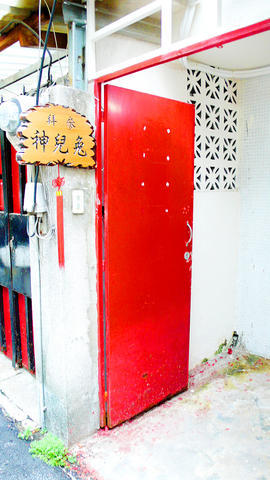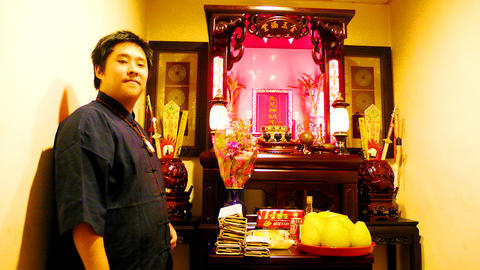On an overcast weekday afternoon, two men in their 20s walked into an unassuming temple nestled in an apartment building in Yonghe City (永和市). "We've been here before. We know the way," they told the priest's assistant, and proceeded to the altar on the second floor. A few minutes later, another young man went downstairs to have his fortune told by Lu Wei-ming (盧威明), a Taoist priest, or fashi (法師). Lu established and tends this shrine, known as the Rabbit Temple (兔兒廟), which is devoted to the rabbit deity (兔兒神) - the patron god of homosexuals.
The god isn't very well known, nor commonly worshipped, but he is based on an historical figure. According to the Tale of the Rabbit God that appears in the Zibuyu (子不語), a collection of supernatural stories written by Qing Dynasty scholar and poet Yuan Mei (袁枚, 1716-1798), Hu Tianbao (?#32993;天保) was an official in 18th-century, Qing Dynasty China. He fell in love with a handsome young imperial inspector of Fujian Province, but because of the inspector's higher status, Hu was afraid to reveal his feelings. After Hu was caught peeping at the inspector through a bathroom wall, he confessed his admiration for the inspector, who had him beaten to death. One month after his passing, the story goes, Hu appeared to a man from his hometown in a dream, claiming that the king of the underworld had appointed him the Rabbit God. As such, his duty was to govern the affairs of men who desire men. In the dream, he asked the man to erect a shrine to him.
As a priest, Lu often heard complaints from homosexual Taoist adherents that there was no god to answer their prayers. Believing one of his missions is to tend to the needs of people alienated from mainstream society, he set out to revive the forgotten deity. As his research suggests, Hu was an upper class historical figure who lived in Fujian from the late Ming Dynasty to the early Qing Dynasty. However, according to Michael Szonyi, associate professor of Chinese history at the department of East Asian Languages and Civilizations at Harvard, the Rabbit God is a pure invention of Yuan, the poet, since the image of the rabbit deity doesn't appear in any other sources from Fujian.

hotos: Ho Yi, Taipei Times
While some aspects of the story may be fabrications, the existence of the cult of Hu Tianbao in Fujian in the 18th century is well documented in official Qing records.
Historical Roots
In his Cult of Hu Tianbao and the 18th-Century Discourse of Homosexuality, which was published in the journal Late Imperial China in 1998, Szonyi discusses the evidence used by the government in its campaign against religious sects. The evidence was given by Zhu Gui (朱珪, 1731-1807), a grain tax who described the iconology of the cult as "two men embracing one another; the face of one is somewhat hoary with age, the other tender and pale." He went on to say that adherents, "on seeing young men desire to have intercourse with them, prayed for assistance from the plaster idol … . Afterwards they plastered the idol's mouth with pork intestine and sugar in thanks."

Photo: Ho Yi, Taipei Times
Later official records suggest that the sect was active in the 19th century, but as Szonyi points out, the chief evidence comes from edicts of imperial officials who tried to suppress the practice, therefore it is impossible to ascertain how the god was perceived from its adherents' point of view.
Lu says that "The deity can be seen as an alternative to Yue Xia Lao Ren (月下老人) [the matchmaker god]. I usually advise gay temple-goers not to go to Yu Lao, [the nickname of the matchmaker god], since love affairs between men and women are believed to be his responsibility. He will be confused by homosexuals' prayers and probably say to himself: 'The prayer doesn't seem right. I'll match you with a woman instead.'"
The Rabbit God is perceived to be an affable deity, Lu said, who is willing to assist his followers in every aspect of life. Since he works for Cheng Huang (城隍), the City God, he has both the erudition and social network in the spiritual world to solve any problem mortals have, according to Lu.
Homosexuals may have an edge in the spiritual world because, "Hu Tianbao is rather self-abased both because of the way he died and the somewhat belittling title of rabbit. So if you are willing to believe in him, he will be much more grateful and work harder than other deities," Lu said.
There are several methods of worshipping, asking for and receiving answers from this divine being, but sincerity is what counts most, Lu said. For this reason, followers should address the god as Ta Yeh (大爺), or master, rather than Rabbit God. Then, those with needs can write down their names, addresses, birthdays and prayers on pieces of paper money and burn them to make sure the messages are sent to heaven.
In another form of worship, personal items can be brought before the alter for Ta Yeh's blessings. Some followers believe that blessed skin-care products are more effective and increase the likelihood of romance. Followers can also take fu (符), paper charms, from the temple, place them under a pillow and pray to the deity to fulfill their wishes before going to bed. To Lu, the praying is meant to encourage contemplation.
sacred to secular
That is the spiritual side of the sect, but Lu is also concerned about the status of homosexuals in society, and that is a major reason for establishing the temple. "Religions both in the West and the East have long pushed the homosexual community into the margin," he said. "But providence is benign, and love is given to all human beings as equals." He also added that the temple is not merely for gay men, but lesbians as well.
Lu is planning religious gay weddings. He wants to deliver a message that religion recognizes the union of homosexual couples, and there is no reason why the state shouldn't do the same.
To a 25-year-old adherent - who requested to be identified as Philippe since his colleagues don't know he is gay - the temple offers a source of comfort in time of trouble. Admitting that he imagined the shrine would be a bit gruesome before the visit, Philippe noted that the whole experience was similar as that of visiting any other temple.
"Although I had a secular upbringing, I still feel the need to seek out comfort in religious faith, to know there is hope I can hold on to, a true love that is not far off," said the young internist, who said he would return to the shrine and give thanks to Ta Yeh if the dinner date after the gay parade last Saturday developed into a long-yearned-for relationship.

May 11 to May 18 The original Taichung Railway Station was long thought to have been completely razed. Opening on May 15, 1905, the one-story wooden structure soon outgrew its purpose and was replaced in 1917 by a grandiose, Western-style station. During construction on the third-generation station in 2017, workers discovered the service pit for the original station’s locomotive depot. A year later, a small wooden building on site was determined by historians to be the first stationmaster’s office, built around 1908. With these findings, the Taichung Railway Station Cultural Park now boasts that it has

Wooden houses wedged between concrete, crumbling brick facades with roofs gaping to the sky, and tiled art deco buildings down narrow alleyways: Taichung Central District’s (中區) aging architecture reveals both the allure and reality of the old downtown. From Indigenous settlement to capital under Qing Dynasty rule through to Japanese colonization, Taichung’s Central District holds a long and layered history. The bygone beauty of its streets once earned it the nickname “Little Kyoto.” Since the late eighties, however, the shifting of economic and government centers westward signaled a gradual decline in the area’s evolving fortunes. With the regeneration of the once

The latest Formosa poll released at the end of last month shows confidence in President William Lai (賴清德) plunged 8.1 percent, while satisfaction with the Lai administration fared worse with a drop of 8.5 percent. Those lacking confidence in Lai jumped by 6 percent and dissatisfaction in his administration spiked up 6.7 percent. Confidence in Lai is still strong at 48.6 percent, compared to 43 percent lacking confidence — but this is his worst result overall since he took office. For the first time, dissatisfaction with his administration surpassed satisfaction, 47.3 to 47.1 percent. Though statistically a tie, for most

In February of this year the Taipei Times reported on the visit of Lienchiang County Commissioner Wang Chung-ming (王忠銘) of the Chinese Nationalist Party (KMT) and a delegation to a lantern festival in Fuzhou’s Mawei District in Fujian Province. “Today, Mawei and Matsu jointly marked the lantern festival,” Wang was quoted as saying, adding that both sides “being of one people,” is a cause for joy. Wang was passing around a common claim of officials of the People’s Republic of China (PRC) and the PRC’s allies and supporters in Taiwan — KMT and the Taiwan People’s Party — and elsewhere: Taiwan and